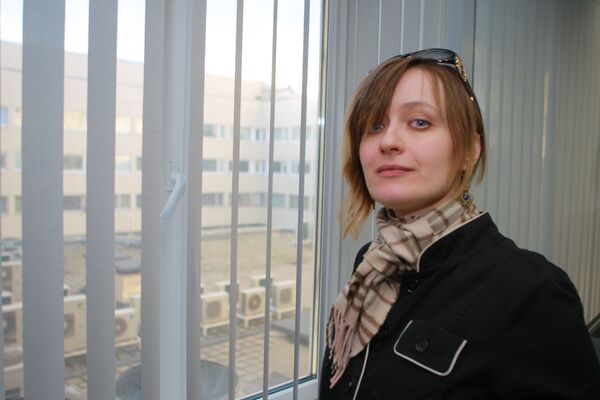Say what you want about Russia - there’s one thing that I hope never changes in this country: and that’s the way in which poetry remains relevant to public life.
Presidential candidate Vladimir Putin reminded me of as much when he stood at Luzhniki Stadium in Moscow and quoted an 1837 Mikhail Lermontov poem about Russian soldiers dying at the Battle of Borodino, which is usually referenced as the bloodiest day of Napoleon’s invasion of Russia.
Analysts are already having a field day as to what the Lermontov quote means in the context of Putin’s campaign - whether or not it’s alarmist, whether it signals strength or, indeed, severe doubt about the future of this nation - but as a literature geek, I was reminded of the big role that poetry plays in public life in Russia.
In this election cycle, writer Dmitry Bykov’s popular “Citizen Poet” project has made for a wonderful mixture of poetry, politics and current affairs. And when people want to make a point about, say, how disappointed they are with education reform, they just whip out the text to a classic Russian poem and loudly complain about how most high-schoolers nowadays have no idea as to who the author is.
Poetry and music are frequently mixed together in the work of rock star and prominent opposition figure Yury Shevchuk, while the Soviet-era children’s poet Agnia Barto is often humorously referenced as a prophet, due to her portrayal of a boy named Volodya (Volodya, for those of my readers who are unfamiliar with how Russian names work, is a diminutive of Vladimir), who never misses a photo opportunity.
All of this is, undoubtedly, a good thing. Back in the States, eloquence is frequently read as a sign of weakness or elitism, and poetry is largely a marginalized art form. I can’t imagine a current American presidential hopeful, whether Republican or Democrat, getting up in front of a stadium full of people and wowing them with some lines from Walt Whitman, who was as quintessentially American as Lermontov was quintessentially Russian. A stadium is for machismo, after all! It’s where athletes take to the field! You can’t be down there using fancy words! You’ll look like an idiot!
In their daily lives, Russians tend to exhibit machismo much more than Americans do. I think this actually explains why so many Russians are suckers for verse, actually. It acts as a kind of psychological balance - and eloquence furthermore legitimizes toughness.
Russian bard Bulat Okudzhava once painted a touching, nostalgic portrait of Russian military officers during the days of the Russian Empire:
“It’s twilight, in the countryside, a flute’s nervous voice / They’re riding late / The emperor is on the horse in front, in a blue caftan / A white mare with brown eyes, with a black mane / A red blanket. Wings behind his back, as if on the eve of a war / After the emperor, the generals are riding / Generals of his escort / They’re swathed in glory, covered in scars, just barely alive / After the generals, come the duelists, the adjutants. Their epaulets are shining. / They’re all beautiful, they’re all talented, they’re all poets.” (The bad translation is mine)
Although Okudzhava wrote his song in 1974, history tells us that in Imperial Russia, being a poet did not preclude being a badass. Lermontov himself was a military officer, for example, and was killed in a duel. The same is true of Russia today.
This is why the language of poetry and the language of politics are so frequently intertwined. It’s not that people don’t mind poetry - they expect it.
In Moscow, riding up the escalator at Mayakovskaya subway station, named for poet Vladimir Mayakovsky, one reads poetry inscribed onto the domed ceiling above. “And the sky, in the smoke, has forgotten that it is blue,” one of the inscriptions reads. The subway passenger, upon reading it, immediately longs for the sky outside - whether blue, or smoky, or otherwise.
Mayakovsky, yet another badass, also lived in an uncertain time for Russia - and his poetry was both artistically and politically relevant. For those who remember, he ended his days tragically. Nowadays, his verse serves as a reminder that beauty and danger don’t just coexist in public life in Russia, they’re frequently indistinguishable from one another.
The views expressed in this article are the author's and do not necessarily represent those of RIA Novosti.
Trendwatching in Russia is an extreme sport: if you’re not dodging champagne corks at weddings, you’re busy avoiding getting trampled by spike heels on public transportation. Thankfully, due to an amazing combination of masochism and bravado, I will do it for you while you read all about it from the safety of your living room.
Natalia Antonova is the deputy editor of The Moscow News. She also works as a playwright – her work has been featured at the Lyubimovka Festival in Moscow and Gogolfest in Kiev, Ukraine. She was born in Ukraine, but spent most of her life in the United States. She graduated from Duke University, where she majored in English and Slavic Literature. Before coming to Moscow, she worked in Dubai, UAE and Amman, Jordan. Her writing has been featured in The Guardian, Foreign Policy, Russia Profile, AlterNet, et al.
Trendswatcher: Whitney Houston Is Dead, Long Live Whitney Houston
Trendswatcher: The Trouble with ‘Intimate’ English
Trendswatcher: When Looking ‘Normal’ is a Matter of Life and Death
Trendswatcher: An Education. The Foreign Kind
Trendswatcher: The rich also bruise
Trendswatcher: Marriage needs magic? Don’t go for the literal kind!
Trendswatcher: Fair elections and “fashion?” Not so fast
Trendswatcher: The way of the gun
Trendswatcher: Buying into the car craze - for sanity’s sake

